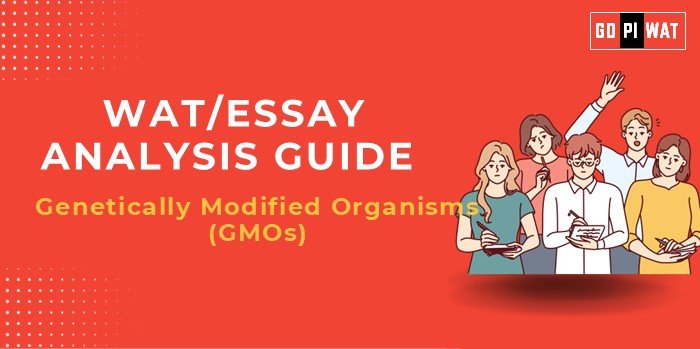📋 Written Ability Test (WAT)/Essay Analysis Guide: Genetically Modified Organisms (GMOs)
🌟 Understanding the Topic’s Importance
GMOs lie at the intersection of ethics, technology, and food security. This makes the topic essential for analyzing the balance between innovation and moral responsibility, critical for B-school discussions on corporate ethics and sustainability.
⏳ Effective Planning and Writing
- 📝 Time Allocation:
- Planning: 5 minutes
- Writing: 20 minutes
- Review: 5 minutes
- 📚 Preparation Tips: Research global GMO statistics, key stakeholders, and ethical perspectives.
📖 Structuring the Essay Body
1. Introduction Templates:
- ⚖️ Contrast Approach: “While GMOs promise to revolutionize agriculture, ethical concerns challenge their widespread acceptance.”
- 🕰️ Timeline Approach: “From early genetic engineering in the 1970s to today’s GMO-dominated farmlands, the debate remains unresolved.”
2. Body Paragraphs:
- 🏆 Achievements: Highlight productivity, pest resistance, and reduced environmental impact.
- ⚠️ Challenges: Discuss ethical concerns, ecological risks, and public opposition.
- 🌍 Future Outlook: Explore advancements, regulatory frameworks, and sustainable practices.
3. Conclusion Templates:
- 🌀 Balanced Perspective: “While GMOs address urgent agricultural challenges, a balanced approach with robust ethical safeguards is essential for long-term sustainability.”
- 🌐 Global Comparison: “The divergent global stance on GMOs underscores the need for context-specific solutions that prioritize ethics alongside innovation.”
✍️ Sample Short Essays
1. Balanced Perspective:
“GMOs offer revolutionary solutions to global food security challenges. However, the ethical concerns surrounding their health impacts, corporate monopolies, and ecological risks necessitate stringent regulations and transparent practices.”
2. Solution-Oriented:
“Ethical use of GMOs can address hunger crises through advanced technology and collaborative governance. Ensuring inclusivity and accountability is key to achieving sustainable progress.”
3. Global Comparison:
“The U.S. has embraced GMOs for agricultural efficiency, while the EU’s precautionary approach reflects public health priorities. A hybrid model can reconcile these differences, ensuring ethical GMO adoption.”


